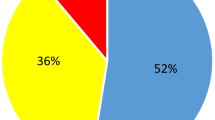Abstract
A global pandemic is underway that has required an overwhelming number of universities and educational institutions across the world to stop all in-person classes. This has mostly been implemented following social distancing guidelines by various governments, some of whom have enforced a complete lockdown of the affected areas. The universities are facing a situation wherein it is believed that this pandemic will eventually be overcome, but if the classes are not conducted and curriculum not completed, the students' career progress will be severely disrupted. In a bid to address this, classes were abruptly shifted to an online format, and the transition happened with a span of 2–4 days. In this work, we present an approach that has been followed to implement this transition.
Access this chapter
Tax calculation will be finalised at checkout
Purchases are for personal use only
Similar content being viewed by others
References
Beichner, R.: The student-centered activities for large enrollment undergraduate programs (SCALE-UP) project. Res. Based Reform Univ. Phys. 1(1), 2–39 (2007)
Burrowes, P.A.: A student-centered approach to teaching general biology that really works: lord’s constructivist model put to a test. Am. Biol. Teach. 65, 491–502 (2003)
Srinivasan S., Centea D.: An active learning strategy for programming courses. In: Auer M., Tsiatsos, T. (eds.) Mobile Technologies and Applications for the Internet of Things. IMCL 2018. Advances in Intelligent Systems and Computing, vol. 909, pp. 327–336 (2019)
Cummings, K., Marx, J., Ronald, T., Dennis, K.: Evaluating innovation in studio physics. Am. J. Phys. 67, S38–S44 (1999)
Sidhu, G., Srinivasan, S.: An intervention-based active-learning strategy to enhance student performance in mathematics. Int. J. Pedagog. Teach. Educ. 2, 277–288 (2018)
Srinivasan, S., Centea, D.: Applicability of principles of cognitive science in active learning pedagogies. In: Proceedings of the 13th International Workshop Active Learning in Engineering. (1ed.) Aalborg Universitetsforlag, pp. 99–104 (2015)
Wage, K.E., Buck, J.R., Wright, C.H.G., Welch, T.B.: The signals and systems concept inventory. IEEE Trans. Educ. 48, 448–461 (2005)
Prince, M.: Does active learning work? a review of the research. J. Eng. Educ. 93, 223–231 (2004)
Srinivasan, S., Rajabzadeh, A.R., Centea, D.: A project-centric learning strategy in biotechnology. In: Auer, M., Hortsch, H., Sethakul, P. (eds.) The Impact of the 4th Industrial Revolution on Engineering Education, ICL 2019, Advances in Intelligent Systems and Computing, vol. 1134, pp. 830–838. Springer, Cham (2020)
Farrell, J.J., Moog, R.S., Spencer, J.N.: A Guided-inquiry general chemistry course. J. Chem. Educ. 76, 570 (1999)
Lewis, S.E., Lewis, J.E.: Departing from lectures: an evaluation of a peer-led guided inquiry alternative. J. Chem. Educ. 82, 135 (2005)
Capon, N., Kuhn, D.: What’s so good about problem-based learning? Cogn. Instr. 22, 61–79 (2004)
Kolb, D.A.: Experiential Learning: Experience as the Source of Learning and Development, 2nd ed., Pearson Education Inc. New Jersey (2015).
Centea, D., Srinivasan, S.: Enhancing student learning through problem based learning. In: Guerra, A., Rodriguez, F.J., Kolmos, A., Reyes, I.P. (eds.) PBL, Social Progress and Sustainability, Aalborg: Aalborg Universitetsforlag. (International Research Symposium on PBL), pp. 376–385 (2017)
Dochy, F., Segers, M., Van den Bossche, P., Gijbels, D.: Effects of problem-based learning: a meta-analysis. Learn. Instr. 13, 533–568 (2003)
Centea, D., Srinivasan, S.: Assessment methodology in a PBL environment. Int. J. Innov. Res. Educ. Sci. 6(6), 364–372 (2016)
Sidhu, G., Srinivasan, S., Centea, D.: Implementation of a problem based learning environment for first year engineering mathematics. In: Guerra, A., Rodriguez, F.J., Kolmos, A., Reyes, I.P. (eds.) PBL, Social Progress and Sustainability, Aalborg: Aalborg Universitetsforlag. (International Research Symposium on PBL), pp. 201–208 (2017)
Muhammad, N., Srinivasan, S.: A problem solving based approach to learn engineering mathematics. In: Auer, M., Hortsch, H., Sethakul, P. (eds.) The Impact of the 4th Industrial Revolution on Engineering Education. ICL 2019. Advances in Intelligent Systems and Computing, vol. 1134, pp. 839–848 (2020)
Olusegun, B.S.: Constructivism learning theory: a paradigm for teaching and learning. ISOR J. Res. Method Educ. 5(6), 66–70 (2015)
Tam, M.: Constructivism, instructional design, and technology: implications for transforming distance learning. Educ. Technol. Soc. 3(2), 50–60 (2000)
Srinivasan, S., Muhammad, N.: Implementation of a course in computational modeling of biological systems in an undergraduate engineering program. Int. J. Eng. Educ. 36(3), 857–864 (2020)
Author information
Authors and Affiliations
Corresponding author
Editor information
Editors and Affiliations
Rights and permissions
Copyright information
© 2021 The Author(s), under exclusive license to Springer Nature Switzerland AG
About this paper
Cite this paper
Muhammad, N., Srinivasan, S. (2021). Transition from In-Class to Online Lectures During a Pandemic. In: Auer, M.E., Centea, D. (eds) Visions and Concepts for Education 4.0. ICBL 2020. Advances in Intelligent Systems and Computing, vol 1314. Springer, Cham. https://doi.org/10.1007/978-3-030-67209-6_33
Download citation
DOI: https://doi.org/10.1007/978-3-030-67209-6_33
Published:
Publisher Name: Springer, Cham
Print ISBN: 978-3-030-67208-9
Online ISBN: 978-3-030-67209-6
eBook Packages: Intelligent Technologies and RoboticsIntelligent Technologies and Robotics (R0)




